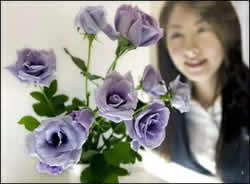Back Home
World's First Blue Rose

June 2004
TOKYO (AFP) -- Major Japanese brewer Suntory unveiled the world's first genetically modified blue rose which it hopes will hit markets within four years.
After 14 years of research, Suntory created the blue rose by implanting the gene that leads to the synthesis of blue pigment in pansies.
The color of the new rose comes entirely from the pigment Delphinidin, which does not exist in natural roses, Suntory said.
"The creation of the blue rose was once believed to be impossible. But we have continued our work to produce (it)," Suntory president Nobutada Saji told a news conference.
Conventional breeding technology can create "blue" roses, which commonly appear purple and gray, rather than striking blue. Their colors come from red or orange pigments and the flowers do not contain Delphinidin.
Suntory's rose also appears to be more violet than blue, with company officials admitting more work was necessary to create roses with bright sky blue colors.
More research is needed to create roses with sky blue. We know we need to add chemical compounds to create brighter blue colors," said Takaharu Tanaka, head of the Institute for Advanced Technology of Suntory that conducts research for biotech business.
"Technologically, we are absolutely successful in creating a blue rose because of the blue pigment in the flower. But for our rose to be recognized by everyone to be blue, maybe we are only a half way there," Tanaka said.
Suntory, also a major whiskey distiller, has spent three billion yen (27.8 million dollars) to create the blue rose, blue carnations and other genetically modified blue flowers.
In 1990 Suntory teamed up with Calgene Pacific, an Australian biotech venture, for the project and bought the firm in 2003, renaming it Florigene Ltd.
Once the blue rose is deemed safe for breeding, Suntory hopes to grow the global market for the genetically modified blue flowers to be worth 30 billion yen.
Suntory officials said it would take at least two and a half years for testing and inspections before the genetically modified plant is deemed safe to breed for the environment.
Suntory hopes to merchandise the blue rose in 2007 or 2008.
"As a company in the food industry, we have developed businesses to enrich people's lives. We have continued research and development activities for our flower operations because flowers add flavors to people's lives and help sustain spiritual health," Saji said.

